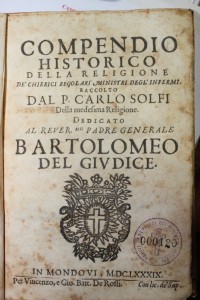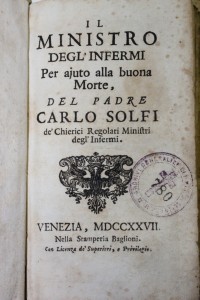 7 June 1694: the date of the death of the most worthy Fr. Carlo Solfi da Monreale, a historian of the Order and the author of a textbook on the Ministers of the Sick
7 June 1694: the date of the death of the most worthy Fr. Carlo Solfi da Monreale, a historian of the Order and the author of a textbook on the Ministers of the Sick
A few years after the publication of the work by Fr. Domenico Regi (Memorie Historiche del Venerabile p. Camillo de Lellis e de’ suoi Chierici Regolari Ministri degli Infermi. Libri quindici di Domenico Regi della medesima Religione), Fr. Carlo Solfi in 1680 took the initiative of abbreviating this weighty tome into a ‘compendium’.
Dedicating himself intensely to this new work, he finished it within a few months – indeed, by the middle of the year 1681. On 8 December 1682 the General Consulta, on the basis of the favourable assessments of the readers that had been entrusted evaluating the work, authorised it to be printed. Later, on 4 May 1687, Fr. Solfi was officially appointed the chronicler of the Order. He updated the compendium with a narrative of the most recent facts, those that had taken place after the Memorie historiche. The work was then printed in 1688 in Mondovì with the title ‘Compendio historico della Religione de’Chierici Regolari Ministri degli Infermi raccolto dal P. Carlo Solfi, Provinciale della medesima Religione, dedicato al Reverendissimo Padre Generale Bartolomeo Del Giudice’ (‘Historical Compendium of the Religion of the Regular Clerics the Ministers of the Sick edited by Fr. Carlo Solfi, Provincial of the Same Religion, dedicated  to the Most Reverend Father General Bartolomeo Del Giudice’.
to the Most Reverend Father General Bartolomeo Del Giudice’.
In the preface to this work the author declared that his purpose was ‘to reduce to a small volume and abbreviate to a compendium what had been more widely narrated before’. In practice, he confined himself to summarising Regi, repeating his anachronisms and his mistakes, with the addition of some news about the period 1675-1688 which were provided on the few documents that he had available, embellished, however, by way of compensation, with a great deal of imagination.
Taken from Sannazzaro, Storia dell’Ordine camilliano (1550-1699), Edizioni Camilliane, Turin, 1986, p. 7.














Camillians on Facebook
Camillians on Twitter
Camillians on Instagram